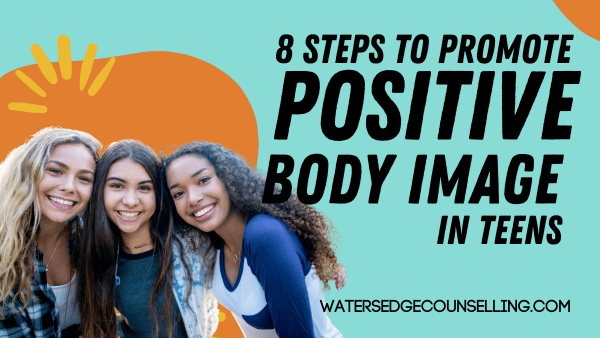
Adolescence is a time of significant physical changes. These changes can lead to feelings of self-consciousness and insecurity as teens compare themselves to their peers and societal standards.
We can support teens by helping them discover tools for self-love and self-acceptance. This way, they can feel confident in their bodies and make the shift from negative to positive self-talk.
The Challenge of Body Image in Today's World
Teens are exposed to unrealistic beauty standards through edited photos and curated images that they see in traditional media, advertising, and social media. This makes it easy to be pressured into looking a certain way or conforming to specific body ideals, which can lead to feelings of inadequacy and the desire to change their appearance.
Moreover, social media can contribute to low self-esteem. It can also play a role in other mental health conditions such as anxiety and depression. This might be because social media triggers comparisons. The anonymity and distance involved may also lead to cyberbullying and negative interactions.
Shifting the Focus: From Appearance to Well-Being
Emphasising well-being over appearance encourages teens to value themselves for who they are rather than how they look. This helps them develop a healthier relationship with their bodies and reduces the pressure to conform to unrealistic beauty standards.
They are more likely to prioritise healthy habits such as exercising regularly, eating balanced nutrition, sleeping enough, and managing stress.
Practical Tools for Promoting Positive Body Image
Adults play a significant role in shaping teens’ attitudes and beliefs about themselves. Here are some tools we can teach them to promote a positive body image:
- Education and media literacy: Offer educational materials that address topics about body image, self-esteem, and media literacy. Teach them about the impact of media on self-perception and unrealistic beauty standards portrayed in the media.
- Healthy lifestyle habits: Teach teens about the importance of taking care of their bodies for health reasons rather than for appearance purposes alone.
- Hobbies and passions: Rather than focusing on their appearance, encourage teens to pursue activities and interests that bring them joy and fulfillment. This can help shift their focus toward personal growth.
- Self-compassion: Encourage teens to practice self-compassion rather than negative self-talk. This can promote acceptance and kindness towards oneself.
- Role modelling: As adults, we can influence how teens view themselves. Model self-acceptance, healthy lifestyle habits, and confidence so teens can follow suit.
The Power of Positive Language
We can help teens shift from harsh self-criticism to positive self-talk.
A 2012 study investigated the impact of self-affirmation on body satisfaction among adolescents. The results showed that affirmed girls had higher body satisfaction and felt less threatened when rating their body shape and weight compared to the control group.
On the other hand, boys displayed lower levels of threat when assessing their body shape and weight, because they got their self-esteem from other sources beyond physical appearance. This may explain why self-affirmation didn't notably affect their body satisfaction.
Self-affirmation involves focusing on positive attributes, values, and strengths in various areas of life. This can be done by writing about your strengths or engaging in positive self-talk.
Positive affirmations are statements that teens can say to themselves to overcome negative thoughts. For example, a teen can reframe negative beliefs about their body by saying:
- “I accept my body the way it is.”
- “I eat for energy and nourishment.”
Positive affirmations can be used in daily life by keeping an affirmations jar, writing them down in a journal, looking at them often, and many other ways.
Building a Supportive Environment
We can help build a supportive environment with a culture of acceptance, inclusivity, and empowerment by encouraging open communication with teens.
Offer an ear and help teens feel comfortable discussing their body image issues. Talk about related topics such as societal pressures, media influences, and your personal experiences with body image.
Promote the idea that beauty comes in many forms. Lastly, make sure to celebrate teens’ strengths and accomplishments that are unrelated to their appearance. This shifts the focus to their other positive qualities.
Empowering Teens to Challenge Beauty Standards
Challenging beauty standards encourages teens to embrace and accept themselves as they are, rather than striving to conform to unrealistic standards. Unrealistic beauty standards can lead to negative consequences such as low self-esteem, body dissatisfaction, and disordered eating behaviours.
Moreover, challenging beauty standards also helps create a more inclusive society where people of all body types and appearances are celebrated.
Remember That Your Support Matters
Teenagers look up to adults. Be a role model for positive body image. Show them that beauty comes in all shapes, sizes, and colours by embracing your own unique qualities and celebrating diversity.
You can make a big difference for teens by supporting and encouraging them as they deal with body image issues. Your words and actions matter, and they can boost their confidence and self-esteem.
Leave a Reply